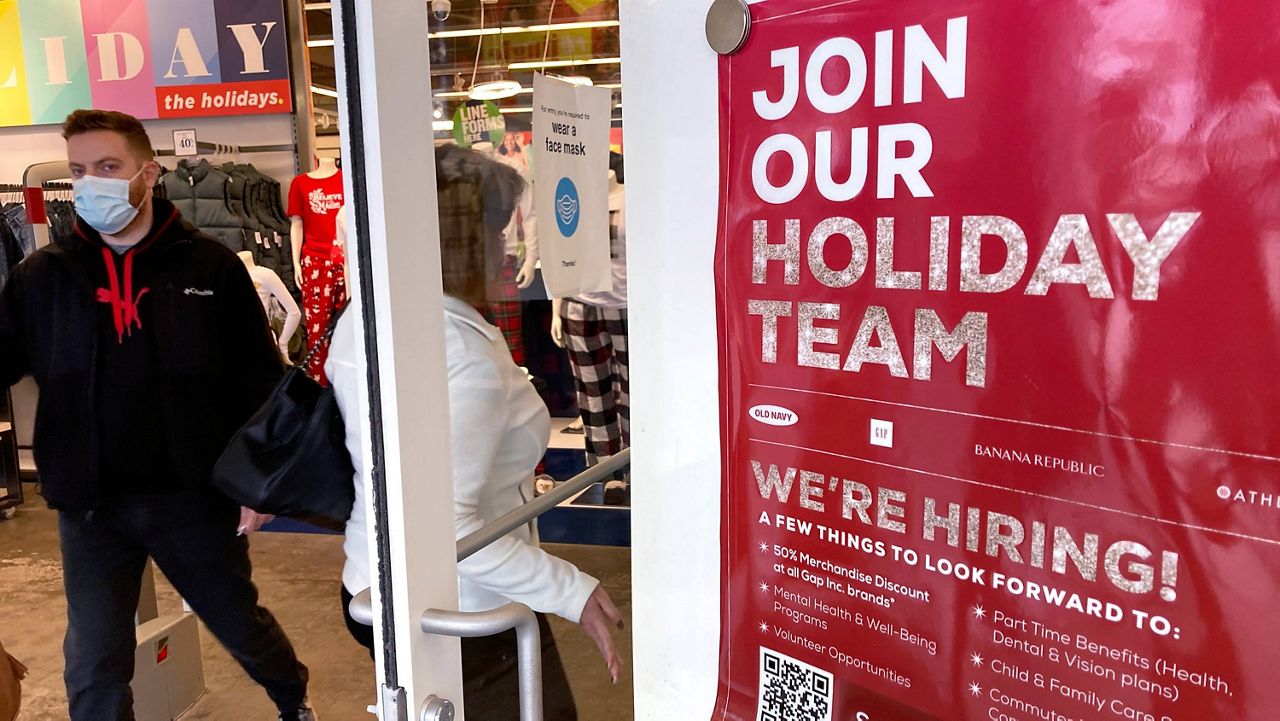The number of Americans applying for unemployment benefits plummeted last week to the lowest level in more than half a century, another sign that the U.S. job market is rebounding rapidly from last year's coronavirus recession.
What You Need To Know
- The number of Americans applying for unemployment benefits plummeted last week to the lowest level in more than half a century, another sign that the U.S. job market is rebounding rapidly from last year's coronavirus recession
- Jobless claims dropped by 71,000 to 199,000, the lowest since mid-November 1969; The drop was much bigger than economists expected
- President Joe Biden called it a "historic jobs recovery," but said there is much more work to be done, including taking action to reduce consumer prices
- The four-week average of claims, which smooths out weekly ups and downs, also dropped — by 21,000 to just over 252,000, the lowest since mid-March 2020
Jobless claims dropped by 71,000 to 199,000, the lowest since mid-November 1969. The drop was much bigger than economists expected.
The four-week average of claims, which smooths out weekly ups and downs, also dropped — by 21,000 to just over 252,000, the lowest since mid-March 2020 when the pandemic slammed the economy.
Since topping 900,000 in early January, the applications have fallen steadily toward and now fallen below their prepandemic level of around 220,000 a week. Claims for jobless aid are a proxy for layoffs.
Overall, 2 million Americans were collecting traditional unemployment checks the week that ended Nov. 13, down slightly from the week before.
"Last year, there were 21 million unemployment insurance claims before the Thanksgiving holiday," President Joe Biden wrote in a statement. "Today, there were 2.4 million."
"This is a historic jobs recovery: 5.6 million jobs created since I took office and an unemployment rate of 4.6% -- two full years earlier than experts predicted was possible," Biden continued. "More Americans are getting back to work and more Americans have money in their pockets, thanks to the American Rescue Plan and the vaccination campaign."
Biden also cited that the U.S. economy "grew at a faster rate in the first three quarters of the year than in any year in nearly 40 years," and according to the Organisation for Economic Co-operation and Development (OECD), the United States is the "only major economy that has exceeded its pre-pandemic level of gross domestic product."
The president said there is still much more work to be done, including driving down consumer prices and addressing rising inflation. Biden touted his announcement on Tuesday to bring down gas prices and his recently passed infrastructure bill, "which will ease supply chain bottlenecks across the economy," and urged the Senate to pass his Build Back Better social spending and climate change bill in order to "cut costs for American families without adding to price pressures."
"Build Back Better will cut the cost of prescription drugs, health care, child care and housing for tens of millions of middle class families and seniors – while extending critical middle class tax relief that is helping working families make ends meet," Biden said.
"Today’s data reinforce the historic economic progress we are making and the importance of building on that progress in the weeks ahead," the president concluded.
Until Sept. 6, the federal government had supplemented state unemployment insurance programs by paying an extra payment of $300 a week and extending benefits to gig workers and to those who were out of work for six months or more. Including the federal programs, the number of Americans receiving some form of jobless aid peaked at more than 33 million in June 2020.
The job market has staged a remarkable comeback since the spring of 2020 when the coronavirus pandemic forced businesses to close or cut hours and kept many Americans at home as a health precaution. In March and April last year, employers slashed more than 22 million jobs.
But government relief checks, super-low interest rates and the rollout of vaccines combined to give consumers the confidence and financial wherewithal to start spending again. Employers, scrambling to meet an unexpected surge in demand, have made 18 million new hires since April 2020 and are expected to add another 575,000 this month. Still, the United States remains 4 million short of the jobs it had in February 2020.
Companies now complain that they can't find workers to fill job openings, a near-record 10.4 million in September. Workers, finding themselves with bargaining clout for the first time in decades, are becoming choosier about jobs; a record 4.4 million quit in September, a sign they have confidence in their ability to find something better.



